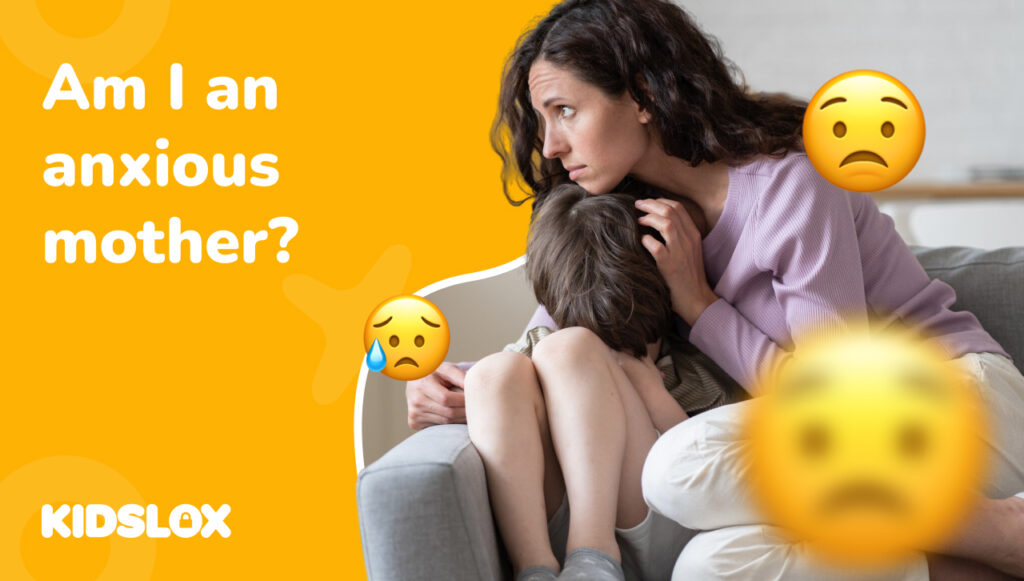Understanding Anxiety in Moms and Its Impact on Families
Motherhood is often described as a time of joy, bonding, and unconditional love—but for many, it’s also a time of worry, overwhelm, and silent struggle. In fact, anxiety in moms is more common than most people realize.
From sleepless nights and the constant fear of “messing it up,” to worrying endlessly about your child’s health, safety, or screen time, mom anxiety can take many forms. And while some level of concern is a natural part of parenting, persistent anxiety can interfere with your ability to enjoy motherhood and connect with your children in a meaningful way.
In this Guide To, we’ll unpack what maternal anxiety looks like, how it affects children—especially those growing up with an anxious mother—and what to do when you realise, “My mom gives me anxiety” or “My mother triggers my anxiety.” Whether you’re a mom with anxiety or the adult child of a mother with anxiety disorder, this post is for you.
What Does It Mean to Be an Anxious Mother?
Being an anxious mom doesn’t mean you’re weak or failing. It means you care—sometimes too much for your own wellbeing. Many mothers experience what’s known as maternal anxiety, a condition where parenting-related stress spirals into chronic worry, intrusive thoughts, or even panic.
This anxiety might focus on:
- Your child’s health or development
- Safety concerns (choking, abductions, accidents, etc.)
- Milestones and academic performance
- Social comparisons (e.g., “I’m not doing enough”)
- Your own adequacy as a parent
Some moms with anxiety describe feeling like they can never relax, even when everything seems fine. Others constantly fear “something bad is about to happen.” This kind of hyper-vigilance can be mentally exhausting and emotionally isolating.
Common Signs of Mom Anxiety
Not all anxiety looks the same, but here are some common signs that might indicate you’re experiencing mother anxiety disorder or persistent mom anxiety:
- Racing thoughts, especially at night
- Obsessive checking (e.g., baby monitors, health symptoms, devices)
- Avoiding situations that feel risky (playdates, travel, screen exposure)
- Emotional reactivity or irritability
- Physical symptoms like headaches, muscle tension, or stomach problems
- Difficulty focusing or feeling “on edge” most of the time
Why Anxiety in Moms Is So Common
So why are so many mothers struggling with anxiety?
- The Mental Load of Modern Motherhood
Today’s moms are expected to be everything: nurturers, breadwinners, educators, screen-time managers, and emotional anchors. Add social media pressure, parenting debates, and a 24/7 news cycle, and it’s easy to see how the worrying mother has become a cultural archetype.
- Hormonal and Biological Factors
Pregnancy, childbirth, and breastfeeding all create huge hormonal shifts. Postpartum anxiety—closely linked to postpartum depression—is often underdiagnosed but just as serious.
- Unresolved Trauma or Family Patterns
If you grew up with an emotionally unavailable or worrying mom, you may be more prone to anxiety yourself. Patterns of overthinking and over-functioning often pass through generations.
- Isolation and Lack of Support
Raising kids without adequate social, emotional, or financial support increases the risk of maternal mental health issues. Many moms with anxiety suffer in silence, fearing judgement or stigma.
Mom Anxiety in Contemporary Culture
The anxious mother has almost become a stereotype. She’s the mom glued to the baby monitor, double-checking every label, spiralling through parenting blogs at 2 a.m., or glued to her child’s location tracker. But while she’s often portrayed with a hint of humour—or judgment—her anxiety reflects something deeper: a cultural climate that constantly tells mothers they’re not doing enough.
Modern parenting exists in a world of hyper-information. Social media floods moms with contradictory advice, perfect-looking families, and endless warnings about dangers both real and imagined. The pressure to be always present, always alert, and always in control isn’t just personal—it’s systemic. In this environment, maternal anxiety doesn’t just happen—it’s cultivated.
Even well-meaning institutions contribute to this anxious culture: schools, healthcare systems, and digital platforms often offload responsibilities onto parents without offering enough support. In contemporary culture, the idea that a “good mom” must be endlessly worried, constantly busy, and fully self-sacrificing is still widespread—and dangerously flawed.
The truth is, anxious doesn’t mean more caring. And in a culture that rewards anxiety as attentiveness, it’s revolutionary for mothers to choose calm, boundaries, and trust instead.
How does being anxious impact your children?
Children are incredibly perceptive. Even if anxiety isn’t openly discussed, they can feel when a parent is anxious, fearful, or emotionally overwhelmed. Growing up with an anxious mother can shape a child’s emotional landscape in complex ways.
Some common effects include:
- Anxiety in the child: They may mirror their mother’s worry and internalize it.
- Hyper-responsibility: Children may become people-pleasers or overachievers to reduce parental stress.
- Avoidance of conflict or risk: Kids may play it safe in life to avoid triggering a parent’s anxiety.
- Feeling like the parent: In some cases, the child may feel responsible for the mom’s emotional wellbeing—a dynamic known as parentification.
When Anxiety Affects the Whole Family
Unchecked anxiety doesn’t just affect the individual—it impacts the entire household. Partners may feel helpless or frustrated. Children may feel smothered or overly scrutinised. Even simple things like choosing schools, managing screen time, or planning family outings can become battlegrounds of overthinking and risk management.
For example:
- Strictly monitor devices, fearing internet harm
- Hover during social interactions to prevent rejection
- Obsess over food safety, leading to restrictive eating habits
- Avoid letting kids walk to school or attend sleepovers
While these behaviours are rooted in love and concern, they can limit a child’s independence, confidence, and sense of safety in the world.
What To Do If You Recognize These Signs in Yourself
If you’re recognising yourself in this post, take a deep breath. You’re not alone. Being a mom with anxiety doesn’t mean you’re a bad parent. It means you’re human, and your brain is trying to keep your loved ones safe, just a little too intensely.
Here are some helpful steps to take:
- Talk About It
Share your feelings with a trusted friend, partner, or therapist. Simply saying, “I think I might be an anxious mom” out loud can reduce shame and open up avenues for support.
- Practice Self-Awareness
Start noticing your triggers. Is it screen time? Illness? Academic performance? Recognizing patterns helps you interrupt them before they spiral.
- Use Grounding Techniques
When anxious thoughts hit, try:
- Deep breathing (inhale 4, hold 4, exhale 4)
- Body scans (checking in with physical sensations)
- Journaling or voice notes to offload mental clutter
- Use Technology Intentionally
If screen time is a source of anxiety, tools like Kidslox can help you manage it with clarity and consistency. Setting digital boundaries gives you control—without needing to micromanage your child’s every move.
- Seek Professional Help
Maternal anxiety is highly treatable. Cognitive behavioural therapy (CBT), mindfulness-based stress reduction (MBSR), or even short-term medication (prescribed by a GP or psychiatrist) can make a huge difference.
What To Do If Your Mom’s Anxiety Affects You
If you’re an adult reflecting on the impact of growing up with a mother with anxiety disorder, or you’re thinking, “My mom gives me anxiety,” it’s important to honour those feelings.
You might feel guilt, especially if your mother’s anxiety was never openly acknowledged. But recognising how that dynamic affected you is not a betrayal—it’s a reclaiming of your emotional space.
Helpful strategies include:
- Naming the dynamic (e.g., “My mother’s anxiety isn’t mine to manage”)
- Setting boundaries around topics that trigger your own stress
- Going to therapy to process childhood experiences and build resilience
- Practicing self-compassion, especially when you catch yourself repeating old patterns
When Anxiety Becomes a Legacy: Breaking the Cycle
For many, maternal anxiety doesn’t begin in motherhood—it’s inherited, often subtly, from childhood experiences. If your own mother was a worrying mom, emotionally reactive, or hypervigilant, you may have unknowingly internalised those behaviours. Perhaps you learned early on that the world is unsafe or unpredictable. Now, as a parent yourself, you might be noticing echoes of her anxiety in your own mind.
Understanding how intergenerational anxiety works helps us break the cycle. If you’ve ever caught yourself saying, “I sound just like my mom,” or, “I don’t want my child to feel how I felt growing up,”—that awareness is your first step toward change.
Children growing up with an anxious mother often become emotional barometers in the household. They learn to read moods, tiptoe around tension, or over-function to keep peace. These coping mechanisms may serve them in childhood, but they often lead to anxiety, perfectionism, or emotional burnout later in life.
Breaking that cycle means gently separating your emotions from your child’s. It means resisting the urge to control every outcome and learning to tolerate uncertainty—something that anxious minds deeply resist, but children desperately need in order to grow.
Self-Care Isn’t a Bubble Bath—It’s Nervous System Repair
Let’s be honest: telling a mom with anxiety to “take a break” or “do some self-care” often misses the point. When your nervous system is constantly in fight-or-flight mode, no amount of candles or journaling can override the physiological patterns built into your body.
Real self-care for an anxious mother looks like:
- Nervous system regulation: Daily practices like deep breathing, walking in nature, EFT tapping, or yoga nidra can help rewire your stress response.
- Information boundaries: Curate your news and social feeds. Exposure to distressing stories (especially about children) can be a major anxiety trigger.
- Saying no: Protect your energy. Limit the number of activities, appointments, or responsibilities you take on.
- Support systems: Whether it’s therapy, a mom’s group, or just one honest friend—connection is key to recovery.
- Rest as resistance: Sleep isn’t lazy. It’s medicine. And it’s essential for mothers living with mother anxiety disorder.
There’s no badge for being the most stressed-out mom. Your family doesn’t need you to be perfect—they need you to be present, grounded, and human.
The Line Between Concern and Anxiety
One of the trickiest things about maternal anxiety is that it often masquerades as “good parenting.” After all, shouldn’t a mother worry? Isn’t it her job to protect her child?
When the “what-ifs” become louder than reality, it’s a sign mom anxiety may be taking the wheel.






